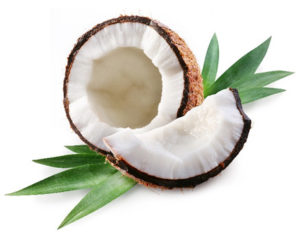Nutty About Coconut Oil
Author: Dr. Stephen Chaney
 Coconut oil is the latest miracle food. Bloggers and talk show hosts are telling us how healthy it is. We are being told to cook with it, spread it on our toast, and put it in our smoothies. We are told to be creative. The more coconut oil you can get in your diet, the better. But, is coconut oil bad for you?
Coconut oil is the latest miracle food. Bloggers and talk show hosts are telling us how healthy it is. We are being told to cook with it, spread it on our toast, and put it in our smoothies. We are told to be creative. The more coconut oil you can get in your diet, the better. But, is coconut oil bad for you?
The hype is working. 72% of the American public believes coconut oil is healthy. This is why the recent American Heart Association (AHA) Presidential Advisory on saturated fats has proven so controversial.
Interestingly, most of the AHA advisory was about the linkage between saturated fats from meat & dairy and heart disease risk. Only one paragraph of the 24-page report was devoted to coconut oil, but the AHA recommendation to avoid coconut oil generated the lion’s share of headlines.
What Did The AHA Presidential Advisory Say?
The AHA advisory concluded that saturated fats from meat and dairy foods increased the risk of heart disease. This conclusion was based on randomized clinical trials in which the diet was carefully controlled for a period of at least two years. More importantly, the conclusion was not based on LDL cholesterol, particle size, HDL cholesterol, inflammation or any other potential marker of heart disease risk. It was based on actual cardiovascular outcomes – heart attacks, strokes, deaths due to heart disease.
I have reviewed the AHA report in a previous issue of “Health Tips From the Professor,” Are Saturated Fats Bad For You, and have concluded their statement that saturated fats from meat and dairy increase the risk of heart disease was based on solid evidence. We can now say definitively that those saturated fats should be minimized in our diets.
Is Coconut Oil Bad For You?
 In contrast to the saturated fats in meat and dairy, there have been no studies looking at the effect of coconut oil on cardiovascular outcomes. Instead, the authors of the AHA report relied on studies measuring the effect of coconut oil on LDL cholesterol levels. There have been 7 controlled trials in which coconut oil was compared with monounsaturated or polyunsaturated oils.
In contrast to the saturated fats in meat and dairy, there have been no studies looking at the effect of coconut oil on cardiovascular outcomes. Instead, the authors of the AHA report relied on studies measuring the effect of coconut oil on LDL cholesterol levels. There have been 7 controlled trials in which coconut oil was compared with monounsaturated or polyunsaturated oils.
- Coconut oil raised LDL cholesterol in all 7 studies.
- The increase in LDL cholesterol in these studies was identical to that seen with butter, beef fat, or palm oil.
This evidence makes it probable that coconut oil increases the risk of heart disease. However, LDL is not a perfect predictor of heart disease risk. The only way to definitively prove that coconut oil increases the risk of heart disease would be to conduct clinical studies in which:
- Coconut oil was substituted for other fats in the diet.
- All other dietary components were kept the same.
- The study lasted at least 2 years.
- Adherence to the “coconut oil diet” was monitored.
- Cardiovascular outcomes were measured (heart attack, stroke, death from heart disease).
In short, one would need the same type of study that supports the AHA warning about saturated fats from meats and dairy. In the absence of this kind of study, there is no “smoking gun.” We cannot definitively say that coconut oil increases the risk of heart disease.
Is Coconut Oil Healthy?
 Does that mean all those people who have been claiming coconut oil is a health food are right? Probably not. At the very least, their health claims are grossly overstated.
Does that mean all those people who have been claiming coconut oil is a health food are right? Probably not. At the very least, their health claims are grossly overstated.
Let’s start with the obvious. In the absence of any long-term studies on the effect of coconut oil on cardiovascular outcomes, nobody can claim that coconut oil is heart healthy. It might be, but it might also be just as bad for you as the saturated fats from meat and dairy. It’s effect on LDL cholesterol suggests it might increase your risk of heart disease, but we simply do not know for certain.
I taught human metabolism to medical students for 40 years. I was also a research scientist who published in peer reviewed journals. When I look at the health claims for coconut oil on the internet, I am dismayed. Many of the claims are complete nonsense. Others sound plausible, but are based on an incomplete understanding of human metabolism. None of them would pass peer review, but, of course, there is no peer review on the internet.
In addition, some of the claims have been “cherry picked” from the literature. For example, claims that coconut oil increases metabolic rate or aids weight loss are based on short-term studies and ignore long-term studies showing those effects disappear over time.
Let me review some of the more plausible-sounding claims for coconut oil.
- Coconut oil increases HDL levels, which is heart healthy. The effects of HDL cholesterol are complex. Elevated HDL levels are not always heart protective.
For example, a few years ago a pharmaceutical company developed a drug that raised HDL levels. They thought they had a blockbuster drug. You didn’t need to exercise. You didn’t need to lose weight. You would just pop their pill and your HDL levels would go up. There was only one problem. When they did the clinical studies, their drug had absolutely no effect on heart disease risk. It turns out it is exercise and weight loss that reduce heart disease risk, not the increase in HDL associated with exercise and weight loss.
The implications are profound. Just because something increases HDL levels does not mean it will reduce cardiovascular risk. You have to actually measure cardiovascular risk before claiming something is heart healthy. That has not been done for coconut oil, so no one can claim it is heart healthy.
- Coconut oil consists of medium chain triglycerides, which are absorbed more readily than other fats. That is true, but it is of interest to you only if you suffer from a fat malabsorption disease. Otherwise, it is of little importance to you.
- Medium chain triglycerides are preferentially transported to the liver, where the fats in coconut oil are converted to energy or released as ketones rather than being stored as fat. This is partially true, but it is misleading for two reasons.
- First, the fat in coconut oil actually has three possible fates in the liver. Some of it will be converted to energy, but only enough to meet the immediate energy needs of the liver. If carbohydrate is limiting, the excess will be converted to ketones and exported to other tissues as an energy source. If carbohydrate is plentiful, the excess will be converted to long chain saturated fats identical to those found in meat and dairy and exported to other tissues for storage.
- Secondly, nobody has repealed the laws of thermodynamics. If the fat in coconut oil is being preferentially used as an energy source by the liver and being exported as ketones to other tissues as an energy source, you need to ask what happens to the calories from the other components in your diet. If you are eating a typical American diet, the carbohydrate that would have been used for energy will be converted to fat and stored. If you are eating a low carbohydrate diet, the other fats that would have been used for energy will simply be stored. Simply put, if you are preferentially using the calories from coconut oil for energy, the calories from the other foods in your diet don’t just evaporate. They are stored as fat.
- Coconut oil increases metabolic rate, which will help you lose weight. When you look at the studies, this is only a temporary effect. This is due to a phenomenon called metabolic adaptation that is often seen when one makes a dramatic shift in diet composition. Initially, you may see an increase in metabolic rate and weight loss. After a few weeks, the body adapts to the new diet,and your metabolic rate returns to normal.
- Coconut oil is metabolized to ketones which have many beneficial effects. There is some truth to this claim. As I discussed in my analysis of the keto diet, ketones have some real benefits, but not nearly as many as proponents claim. Furthermore, the amount of ketones produced by coconut oil will depend on the availability of carbohydrate. Much of the coconut oil in the context of a very low carbohydrate diet will likely be converted to ketones. Coconut oil spread on a piece of bread or used in baking is more likely going to be converted to fat.
I could go on, but you get the point. The hype about the benefits of coconut oil sounds good, but is misleading. There may be some benefits, but in the absence of long-term studies we have no convincing evidence that coconut oil is good for us.
What Does This Mean For You?
 When you started reading this article, you were probably hoping that I would settle the coconut oil controversy. Perhaps you were hoping that I would tell you the American Heart Association was right, and you should avoid coconut oil completely. More likely you were hoping I would tell you the coconut oil proponents were right and you could continue looking for more ways to incorporate coconut oil into your diet. As usual, the truth is somewhere in between.
When you started reading this article, you were probably hoping that I would settle the coconut oil controversy. Perhaps you were hoping that I would tell you the American Heart Association was right, and you should avoid coconut oil completely. More likely you were hoping I would tell you the coconut oil proponents were right and you could continue looking for more ways to incorporate coconut oil into your diet. As usual, the truth is somewhere in between.
Coconut oil may increase our heart disease risk, but the evidence is not definitive. We cannot say with certainty that coconut oil is bad for us. On the other hand, most of the hype about the benefits of coconut oil is inaccurate or misleading. We have no well-designed, long-term studies on health outcomes from coconut oil use. We cannot say with certainty that coconut oil is good for us.
I recommend moderation. Small amounts of coconut oil are probably alright. If you have a particular recipe for which coconut oil gives the perfect flavor, go ahead and use it. Just don’t add it to everything you eat.
Finally, there are other oils we know to be healthy that you can use in place of coconut oil. If you are looking for monounsaturated oils, olive oil and avocado oil are your best bets. Olive oil can be used in salads and low temperature cooking. Avocado oil is better for high temperature cooking. Also, less frequently mentioned, safflower and sunflower oils are also good sources of monounsaturated fats.
If you are looking for a mixture of monounsaturated and polyunsaturated fats, safflower oil, canola oil and peanut oil are your best bets. Peanut oil is also good for high temperature cooking.
Corn oil and soybean oil are your best sources of omega-6 polyunsaturated fats, while flaxseed oil is your best vegetable source of omega-3 polyunsaturated fats.
The Bottom Line
- Coconut oil is the latest diet fad. It is highly promoted by the popular press, and 72% of Americans think it is healthy, even though it is a saturated fat.
- The American Heart Association (AHA) has recently advised against the use of coconut oil because it likely increases the risk of heart disease and “has no offsetting beneficial effects.” Because this statement is controversial, I have carefully analyzed the pros and cons of coconut oil use.
- Coconut oil may increase our heart disease risk, but the evidence presented by the American Heart Association is not definitive. We cannot say with certainty that coconut oil is bad for us.
- On the other hand, most of the hype about the benefits of coconut oil is inaccurate or misleading. We have no well-designed, long-term studies on health outcomes from coconut oil use. We cannot say with certainty that coconut oil is good for us.
- I recommend moderation. Small amounts of coconut oil are probably alright. If you have a particular recipe for which coconut oil gives the perfect flavor, go ahead and use it. Just don’t add it to everything you eat.
- For details of my analysis and suggestions for healthy fats you can substitute for coconut oil, read the article above.
These statements have not been evaluated by the Food and Drug Administration. This information is not intended to diagnose, treat, cure or prevent any disease.
